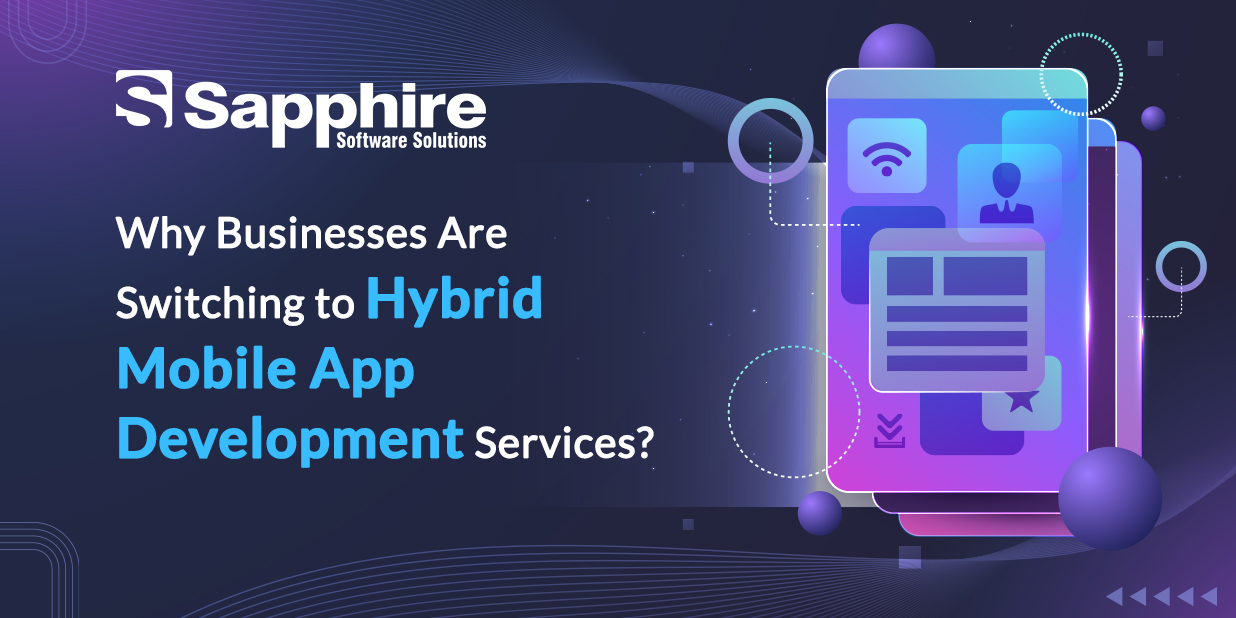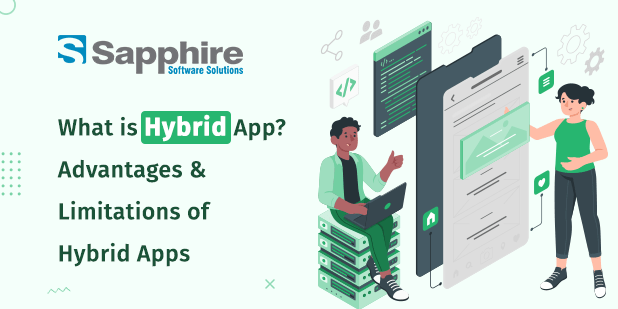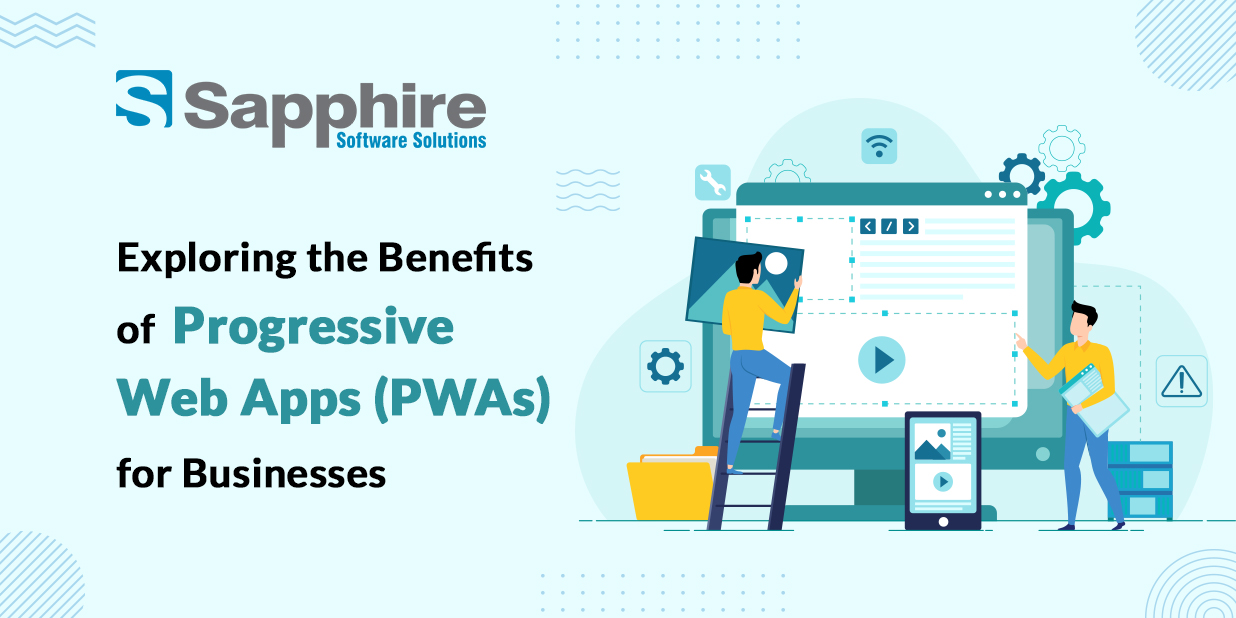What is Hybrid Mobile App Development?
Hybrid Mobile App Development is the practice of creating a single mobile app that can be executed on several operating systems, including iOS, Android, as well as even web browsers, with one codebase. Rather than developing different code for every platform (like one does in native development), hybrid development leverages web technologies such as HTML5, CSS, and JavaScript, typically ensconced inside a native container through platforms like React Native or Flutter.
How Hybrid Mobile App Development is different?
- One Codebase for Every Platform
Part of the biggest benefits is that the developers code the application once and push it to every platform. This reduces the time and expense of development, along with providing consistency in form and functionality.
- Web + Native Fusion
Hybrid apps are web apps packaged inside native shells. The shells engage with the hardware of the device using plugins, which enable hybrid apps to leverage features such as the camera, GPS, and push notifications, just as native apps do.
- Utilization of Sophisticated Frameworks
Sophisticated Hybrid Mobile App Development Frameworks such as Flutter and React Native offer native performance and look, rendering hybrid apps nearly unrecognizable from their native equivalents in most applications.
- Simpler Maintenance and Updates
Hybrid apps share a single codebase, meaning that updates and patches are done once and then rolled out to all platforms—effort saved, and errors eliminated.
- Cost-Effective and Scalable
Start-ups and companies with limited budgets will find Hybrid Mobile App Development to be an economical solution. It provides you with the ability to build once, save, and scale later as your user base increases.
In effect, hybrid development is the intelligent cross between native performance and web ease, perfect for companies wanting to tap into a wider audience with fewer resources.
What is a Native Mobile App?
When folks mention apps that “just work” — silky-smooth scrolling, fast launch times, and consistent offline availability — it’s likely they’re referring to native mobile apps. A native mobile app is simply a mobile app that’s designed expressly for one platform, such as iOS or Android. It’s coded using the programming language the platform knows best — Swift or Objective-C for iOS, and Java or Kotlin for Android.
- Why is that important? Because when an app is designed to fit the DNA of a specific platform, it’s capable of delivering a smoother user experience. The look and feel are natural, the responsiveness is quicker, and the app gets to use all the phone’s native capabilities — camera, microphone, GPS, notifications — without having to work around it. That’s the sorcery of going native.
- For instance, consider your go-to social networking app — the manner it loads photos smoothly, scrolls endlessly, and supports gestures such as swiping and pinching. That’s not by chance. Native apps can leverage the complete power of the hardware and operating system of your phone, which tends to equate to improved performance and fewer bugs than other apps.
- It’s not all rosy and sunny, though. Building a native app requires having distinct codebases for each platform. Therefore, if you desire an app that functions on both iPhones and Android devices, you will have to build two different ones — doubling the effort, time, and expense.
- In summary, a native mobile app is a custom-fitted suit. It’s designed to fit perfectly, with tools and materials that are tailored to the platform specifically. Sure, it takes more resources initially, but the result is a better, faster, and more compelling experience for your users, often the difference-maker in today’s competitive mobile environment.
Native vs Hybrid Mobile App Development: What’s Right for Your Business?
So, you’re building an app. First question that’ll hit you: Native or Hybrid Mobile App Development? I get it – there’s tons of advice out there, but most of it sounds like it came from a textbook. Here’s the real deal.
- Native mobile apps? They’re made for one platform only. iOS gets Swift, Android gets Kotlin or Java. Performance is killer, everything feels smooth. But here’s the catch – you’re building two apps if you want both platforms.
- Hybrid mobile app development is different. One codebase, multiple platforms. Usually, JavaScript or Dart does the heavy lifting with those hybrid mobile app development languages. Not quite as snappy as native, but close enough that most users won’t notice.
- Here’s what I’ve seen work: If you’re doing something graphics-heavy or need every millisecond of performance (think trading apps or games), go native. Your users will thank you later. But for most businesses? Hybrid mobile app development services make sense. Especially with React Native and Flutter getting better every year.
- Flutter app development services have this rendering thing that makes apps look identical everywhere. React Native app development services got Meta backing, plus a huge community, so finding developers isn’t impossible.
- The dirty secret nobody talks about when comparing Native vs Hybrid Mobile App Development: it’s not just about the tech. You need a hybrid mobile app developer who gets what you’re trying to do. I’ve seen great hybrid mobile app development frameworks ruined by teams that didn’t understand the business side.
Advantages of Hybrid Mobile Application Development:
If you’re a company wanting to develop an app in the rapidly changing digital era, one term you’ve probably heard about is Hybrid Mobile App Development. And it’s no wonder. This method provides the perfect balance of speed, scalability, and cost-effectiveness that’s difficult to find elsewhere. But what does it mean to be “hybrid,” and why are more startups and companies opting for it over native development?
Let’s break it down in Real-World Terms.
- Fundamentally, Hybrid Mobile App Development enables you to create one application that operates on several platforms—usually iOS and Android—based on a single codebase. Unlike native apps, which are developed independently for each platform with various mobile app development languages, hybrid apps depend on common web technologies such as HTML, CSS, and JavaScript, usually combined with robust Hybrid Mobile App Development Frameworks like Flutter or React Native.
- One of the greatest benefits in this case is cost-effectiveness. As you don’t require different development teams for iOS and Android, your Hybrid Mobile App Development Cost comes down substantially. This makes hybrid development a good choice for startups or small companies that wish to dip their toes in the water before fully splurging.
- Performance is yet another domain where hybrid excels beyond your imagination. Due to improvements in Hybrid Mobile App Development Technologies, hybrids today can offer near-native performance. With tools such as React Native App Development Services, your app can tap into native APIs and offer a smooth user experience that is on par with native offerings. Likewise, Flutter App Development Services enable developers to build aesthetically pleasing and high-performance apps with just one codebase.
- Also, the scalability and flexibility of hybrid apps are ideal for developing business models that change over time. When your business expands, an experienced Hybrid Mobile App Developer can easily scale the app without having to rewrite it from the ground up. With an experienced Hybrid Mobile App Development Company, your project will be handled by professionals who understand how to maximize hybrid frameworks’ performance while streamlining your development process. Don’t forget about maintainability. With less code and a more streamlined architecture, hybrid apps are simpler (and less expensive) to maintain.
- In the age-old war of Native vs Hybrid Mobile App Development, the equation is shifting towards hybrid, particularly for those businesses that prioritize flexibility, cost-effectiveness, and quick turnaround times. Whether you’re looking to release your first app or ramp up an existing one, the right Hybrid Mobile App Development Service can enable you to create an experience that suits your users as well as your bottom line.
Most Popular Frameworks for Hybrid Mobile App Development:-
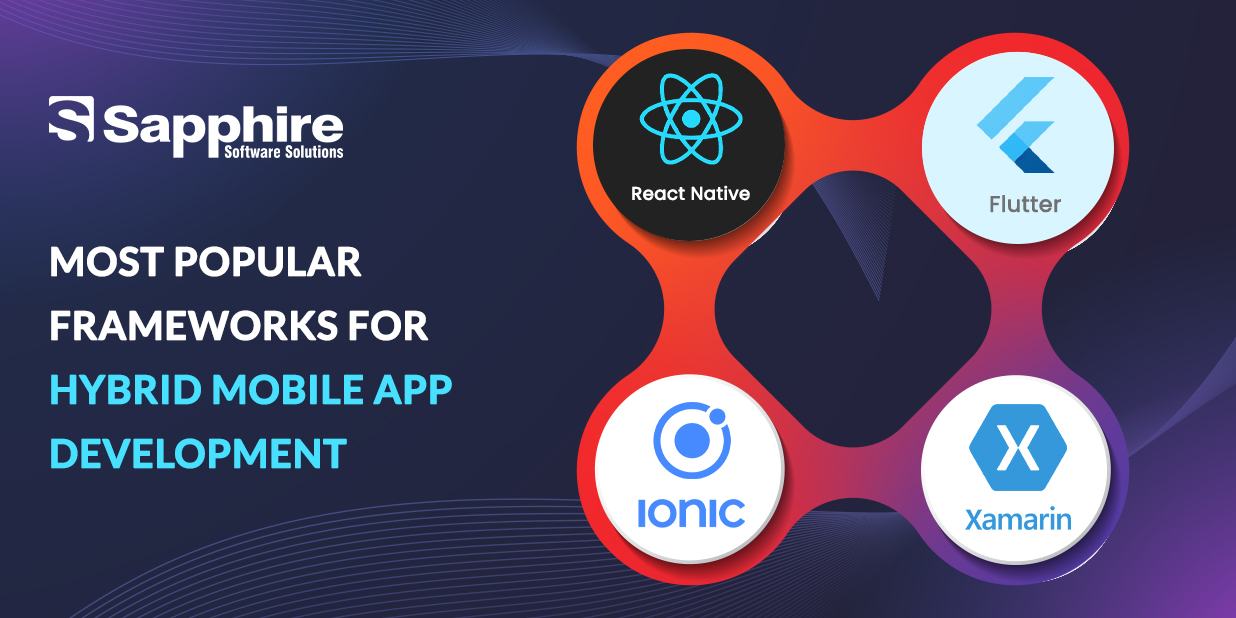
Building apps that work everywhere without breaking the bank? Hybrid Mobile App Development is where most smart businesses land. But here’s the thing – picking the wrong Hybrid Mobile App Development Frameworks can mess up your whole project.
Let’s break down what works for Hybrid Mobile App Developers these days.
1. React Native:
Facebook built this, and it shows. React Native lets you write once, run everywhere. Performance feels almost native, which is huge. React Native App Development Services are everywhere now, and your Hybrid Mobile App Development Cost stays reasonable. The community around it is massive. Need something? Someone’s probably already built it. Plus, it plays nicely with native stuff when you need it. Makes that whole Native vs Hybrid Mobile App Development choice way easier.
2. Flutter:
Google’s baby. Flutter makes pretty apps fast. Uses Dart, which isn’t everyone’s favorite, but Flutter App Development Services deliver solid results. Hot reload means you see changes instantly while coding. Hybrid Mobile App Development Companies love it because the UI looks identical everywhere. Your Hybrid Mobile App Development Cost stays low while apps look expensive.
3. Ionic:
Been around forever. Built on Angular and Cordova, works with normal Hybrid Mobile App Development Languages like HTML, CSS, JavaScript. Easy to learn, tons of plugins. Not as fast as React Native or Flutter for heavy stuff, but perfect if you need something basic out the door quickly.
4. Xamarin:
Microsoft’s thing. Uses C#, good if you’re already deep in the Microsoft world. Not as popular anymore since React Native and Flutter took over, but still solid for enterprise apps.
Why Framework Choices Matter?
Your framework choice affects everything – which Hybrid Mobile App Development Technologies you use, how fast you launch, and how well your app grows. Get it wrong and you’re rebuilding later. React Native, Flutter, Ionic – they all work, just depends on what you need.
How Do You Choose the Right Hybrid Mobile App Framework?
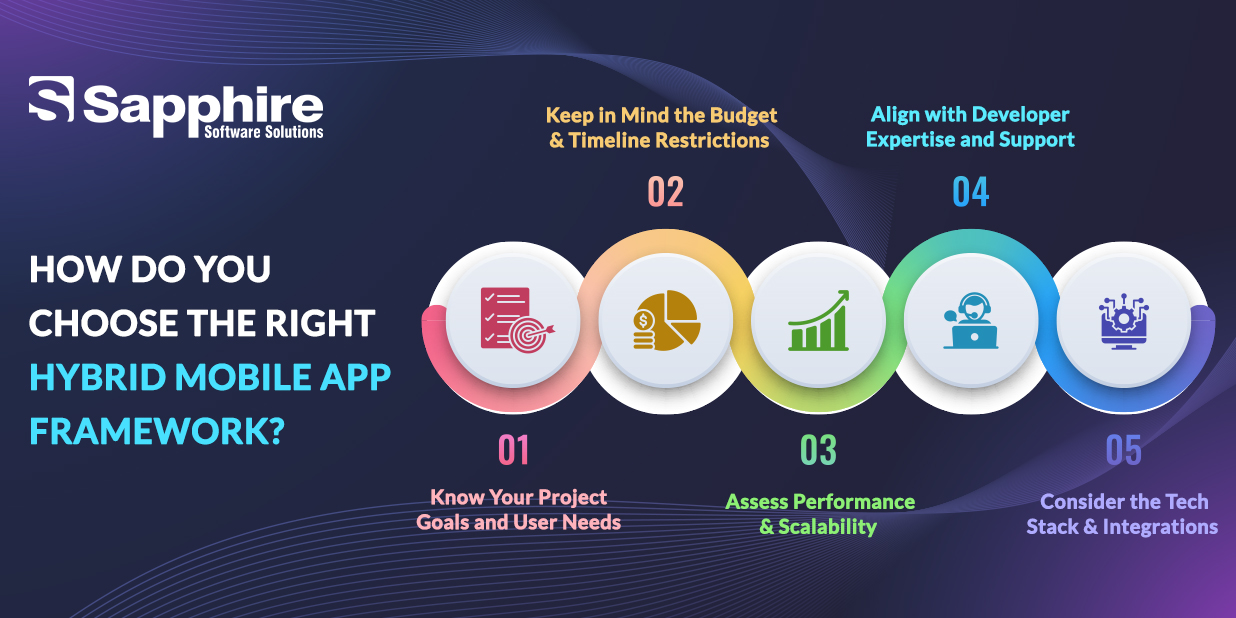
Selecting the most appropriate framework for your Hybrid Mobile App Development project is not merely a technical choice—it’s a strategic one. The framework you choose has an impact on everything from user experience to scalability, development time, upkeep, and even cost. In today’s app-economy, making the correct choice can make or break your app’s success story or turn it into another download that gets trashed. Here’s a people-first analysis to guide you through that choice with confidence.
- Know Your Project Goals and User Needs:
Start by clearly defining what you want your app to do. Is it a content-heavy news platform? A social media app? An eCommerce solution? For instance, if animation and high performance are most important, Flutter App Development Services may be appropriate. But in case you require quick time-to-market and a large pool of developers, React Native App Development Services will prove to be more beneficial.
- Keep in Mind the Budget and Timeline Restrictions:
There are restrictions in every business, particularly in development budgets and timelines. That’s where the Hybrid Mobile App Development Cost comes into play. Platforms such as Flutter and React Native save cost largely by allowing code sharing across platforms. This translates into fewer developers, quicker rollout, and lower overhead.
- Assess Performance and Scalability:
Performance does count, particularly in apps with intricate features or real-time engagement. If you’re building a game or AR-enabled application, you may even prefer native development. However, if you are concerned with usual business applications, contemporary Hybrid Mobile App Development Frameworks such as React Native and Flutter deliver performance that is nearly native. You should also consider the long-term.
- Align with Developer Expertise and Support:
Another critical component is the skills of your in-house team. If your developers are more familiar with JavaScript, then React Native is an easier transition. If you’re looking to hire, ensure your Hybrid Mobile App Developer has practical exposure to your chosen framework. It’s also wise to use a Hybrid Mobile App Development Company that can provide ongoing support, updates, and debugging well after release.
- Consider the Tech Stack and Integrations:
Frameworks accommodate various Hybrid Mobile App Development Languages, libraries, and integration support. Think about what third-party APIs, payment gateways, or analytics tools you require, and verify that the framework has seamless integration support.
Best Practices for Hybrid Mobile Application Development:-
In our rapidly changing digital age, Hybrid Mobile App Development has emerged as a wise option for companies that want to engage users on multiple platforms without breaking their budgets or timelines. But success with hybrid apps is not a guarantee. Like any software project, it demands the optimal strategy, tools, and talent. If you’re a startup entrepreneur or a CTO of an expanding business, adhering to major best practices can either make or break your app’s success.
1. Select the Correct Framework from the Beginning:
The basis of any successful Hybrid Mobile App Development project starts with choosing the correct framework. Among the most reliable Hybrid Mobile App Development Frameworks are React Native and Flutter, both of which have their strengths. For applications requiring a responsive and quick UI, Flutter App Development Services are a better option. When you want comprehensive community support and effortless updates, React Native App Development Services might be a better option. Both minimize Hybrid Mobile App Development Cost by enabling code reuse and quicker deployment.
2. User Experience (UX) focus:
Although you’re creating a hybrid app, your users should not perceive any compromise on quality. Native-like interactions, responsive layouts, and clean navigation are a must. This is where the Native vs Hybrid Mobile App Development debate comes into the picture. Your hybrid app should be made to behave like a native app as much as possible. Spending money on the correct design tools and seasoned UX professionals will help you provide a refined experience.
3. Use Scalable and Secure Coding Practices:
More users mean more problems if your code can’t handle it. Pick Hybrid Mobile App Development Languages that won’t break when things get busy. Don’t mess around with security, especially if you’re handling payments or personal info.
4. Plan for Ongoing Maintenance and Updates:
Your app’s never really finished. Bugs pop up, users want new stuff, and tech changes. You’ll need updates constantly. Find a Hybrid App Development Service that sticks around long-term, not just someone who disappears after launch.
What makes Sapphire’s Hybrid Mobile App Development Service stand out from other companies?
Selecting a partner for development can be daunting in today’s saturated tech environment, particularly when each company offers “best-of-the-best” solutions. What sets Sapphire’s Hybrid Mobile App Development Service apart, then?
At Sapphire Software Solutions, we don’t create apps—we create experiences that endure. Our philosophy extends far beyond code. We believe in empathizing with your brand, your users, and your long-term vision. That’s why businesses ranging from start-ups to enterprises partner with us for their Hybrid Mobile App Development requirements.
- Customized Strategy, Rather Than a Cookie-Cutter Solution
Most development firms follow a one-size-fits-all approach. But at Sapphire, every client receives a tailored approach linked to their industry trends and objectives. Whatever you decide regarding Native vs Hybrid Mobile App Development or whether to use Hybrid Mobile App Development Frameworks, we will lead you through each step.
- Cost-effective without compromising
Budget is important—but so is quality. Sapphire finds the ideal balance between cost and innovation. Our defined project plan allows you to know the Hybrid Mobile App Development Cost in advance, with no hidden fees.
- End-to-End Expertise Under One Roof
We handle everything. Design, coding, testing – no bouncing between different companies. Our Hybrid Mobile App Developer team knows the latest Hybrid App Development Languages inside out. Fast builds, solid performance.
- Mastery of Leading Frameworks
Pick the wrong framework and you’re screwed. We know Flutter App Development Services and React Native App Development Services both well. Means we use whatever fits your situation best, not just what we happen to like.
- True Partnership, Not Just Development
We’re not just another Hybrid Mobile App Development Company that disappears after delivery. We stick around. Updates, fixes, new ideas – we’re here for all of it. Your app needs to work in the real world, not just on paper.
Conclusion:
In the hyper-connected, mobile-first digital world of today, companies worldwide are turning their focus to Hybrid Mobile App Development, and there are sound reasons for it. The move is not solely about cost-effectiveness or cross-platform support; it’s a question of agility, scalability, and faster response to market demands. Businesses need to be present wherever their customers are—be it on Android, iOS, or the web—without replicating effort or ballooning budgets.
In summary, the hybrid strategy combines the strengths of both worlds—native-like performance and web-like efficiency. Collaborating with an experienced Hybrid Mobile App Development Company like Sapphire Software Solutions guarantees businesses can reap these advantages with quality, speed, and reliability.



















